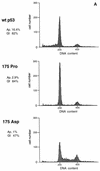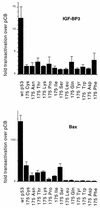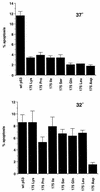Characterization of structural p53 mutants which show selective defects in apoptosis but not cell cycle arrest
- PMID: 9632751
- PMCID: PMC108951
- DOI: 10.1128/MCB.18.7.3692
Characterization of structural p53 mutants which show selective defects in apoptosis but not cell cycle arrest
Abstract
Suppression of tumor cell growth by p53 results from the activation of both apoptosis and cell cycle arrest, functions which have been shown to be separable activities of p53. We have characterized a series of p53 mutants with amino acid substitutions at residue 175 and show that these mutants fall into one of three classes: class I, which is essentially wild type for apoptotic and cell cycle arrest functions; class II, which retains cell cycle arrest activity but is impaired in the induction of apoptosis; and class III, which is defective in both activities. Several residue 175 mutants which retain cell cycle arrest function have been detected in cancers, and we show that these have lost apoptotic function. Furthermore, several class II mutants have been found to be temperature sensitive for apoptotic activity while showing constitutive cell cycle arrest function. Taken together, these mutants comprise an excellent system with which to investigate the biochemical nature of p53-mediated apoptosis, the function of principal importance in tumor suppression. All of the mutants that showed loss of apoptotic function also showed defects in the activation of promoters from the potential apoptotic targets Bax and the insulin-like growth factor-binding protein 3 gene (IGF-BP3), and a correlation between full apoptotic activity and activation of both of these promoters was also seen with the temperature-sensitive mutants. However, a role for additional apoptotic activities of p53 was suggested by the observation that some mutants retained significant apoptotic function despite being impaired in the activation of Bax- and IGF-BP3-derived promoters. In contrast to the case of transcriptional activation, a perfect correlation between transcriptional repression of the c-fos promoter and the ability to induce apoptosis was seen, although the observation that Bax expression induced a similar repression of transcription from this promoter suggests that this may be a consequence, rather than a cause, of apoptotic death.
Figures







Similar articles
-
Differential activation of target cellular promoters by p53 mutants with impaired apoptotic function.Mol Cell Biol. 1996 Sep;16(9):4952-60. doi: 10.1128/MCB.16.9.4952. Mol Cell Biol. 1996. PMID: 8756654 Free PMC article.
-
A transcriptional activation function of p53 is dispensable for and inhibitory of its apoptotic function.Oncogene. 2001 Feb 8;20(6):659-68. doi: 10.1038/sj.onc.1204139. Oncogene. 2001. PMID: 11313999
-
Mechanisms of differential activation of target gene promoters by p53 hinge domain mutants with impaired apoptotic function.J Biol Chem. 2001 Aug 31;276(35):32990-3000. doi: 10.1074/jbc.M103681200. Epub 2001 Jun 6. J Biol Chem. 2001. PMID: 11395510
-
BCL2 family in DNA damage and cell cycle control.Cell Death Differ. 2006 Aug;13(8):1351-9. doi: 10.1038/sj.cdd.4401987. Epub 2006 Jun 9. Cell Death Differ. 2006. PMID: 16763616 Review.
-
Mouse models of p53 functions.Cold Spring Harb Perspect Biol. 2010 Apr;2(4):a001115. doi: 10.1101/cshperspect.a001115. Epub 2009 Dec 9. Cold Spring Harb Perspect Biol. 2010. PMID: 20452944 Free PMC article. Review.
Cited by
-
Association of ESR1 germline variants with TP53 somatic variants in breast tumors in a genome-wide study.medRxiv [Preprint]. 2023 Dec 6:2023.12.06.23299442. doi: 10.1101/2023.12.06.23299442. medRxiv. 2023. Update in: Cancer Res Commun. 2024 Jun 27;4(6):1597-1608. doi: 10.1158/2767-9764.CRC-24-0026. PMID: 38106140 Free PMC article. Updated. Preprint.
-
Pyrophen Isolated from the Endophytic Fungus Aspergillus fumigatus Strain KARSV04 Synergizes the Effect of Doxorubicin in Killing MCF7 but not T47D Cells.Turk J Pharm Sci. 2020 Jun;17(3):280-284. doi: 10.4274/tjps.galenos.2019.30633. Epub 2020 Jun 22. Turk J Pharm Sci. 2020. PMID: 32636705 Free PMC article.
-
Tumor-associated mutant p53 promotes cancer cell survival upon glutamine deprivation through p21 induction.Oncogene. 2017 Apr 6;36(14):1991-2001. doi: 10.1038/onc.2016.360. Epub 2016 Oct 10. Oncogene. 2017. PMID: 27721412 Free PMC article.
-
Concerted regulation of wild-type p53 nuclear accumulation and activation by S100B and calcium-dependent protein kinase C.Mol Cell Biol. 1999 Oct;19(10):7168-80. doi: 10.1128/MCB.19.10.7168. Mol Cell Biol. 1999. PMID: 10490652 Free PMC article.
-
IGFBP-3 mediates p53-induced apoptosis during serum starvation.Int J Oncol. 2002 Aug;21(2):327-35. Int J Oncol. 2002. PMID: 12118329 Free PMC article.
References
-
- Antonsson B, Conti F, Ciavatta A, Montessuit S, Lewis S, Martinou I, Bernasconi L, Bernard A, Mermod J-J, Maxxei G, Maundrell K, Gambale F, Sadoul R, Martinou J-C. Inhibition of Bax channel-forming activity by Bcl-2. Science. 1997;277:370–372. - PubMed
-
- Bates S, Vousden K H. p53 in signalling checkpoint arrest or apoptosis. Curr Opin Genet Dev. 1996;6:1–7. - PubMed
-
- Brugarolas J, Chandrasekaran C, Gordon J I, Beach D, Jacks T, Hannon G J. Radiation-induced cell cycle arrest compromised by p21 deficiency. Nature. 1995;377:552–556. - PubMed
-
- Buckbinder L, Talbott R, Velasco-Miguel S, Takenaka I, Faha B, Seizinger B R, Kley N. Induction of the growth inhibitor IGF-binding protein 3 by p53. Nature. 1995;377:646–649. - PubMed
-
- Caelles C, Helmberg A, Karin M. p53-dependent apoptosis in the absence of transcriptional activation of p53-target genes. Nature. 1994;370:220–223. - PubMed
Publication types
MeSH terms
Substances
LinkOut - more resources
Full Text Sources
Other Literature Sources
Research Materials
Miscellaneous
